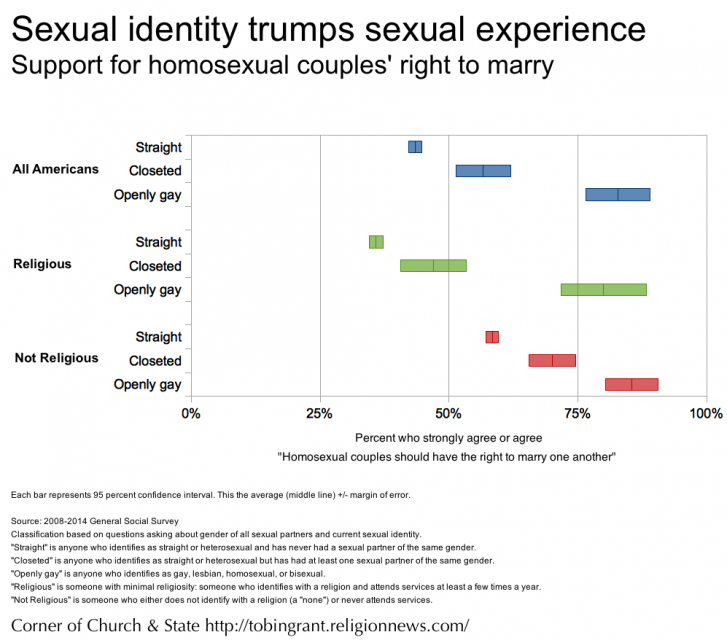Here’s some data that shows the complexity of sexuality and politics. Support for same-sex marriage depends much more on sexual identity than on sexual history.
Most adults who have had sex with someone of the same gender do not identify as gay, lesbian, or bisexual. As I noted in a previous post, only two percent of Americans identify as gay, lesbian, or bisexual. But there is another group between four and five percent of Americans who say that they are “straight” or “heterosexual” even though they have had homosexual sex. It turns out that these two groups differ on the question of same-sex marriage. Those who identify as gay are very supportive of same-sex marriage, but those who have had gay sex but don’t identify as such are closer to straight people. This is particularly true among those who are at least minimally religious.
These results are based on the General Social Survey (GSS). Since 2008, the GSS has asked people about same-sex marriage, their sexual identity, and their sexual history. Based on these questions, we can compare how people identify themselves (straight, gay, lesbian, or bisexual) and their sexual history, which may include homosexual experiences. There are three categories that we can put people:
- Straight: Identify as straight or heterosexual and who have never had homosexual sex.
- Closeted: Identify as straight or heterosexual but who have had sex with someone of the same gender.
- Openly gay: Identify as gay, lesbian, homosexual, or bisexual.
The term “closeted” here simply means that their identity doesn’t match their sexual experience. Some of them may not be willing to say to a survey researcher that they are gay. Others may view their past experiences as unrelated to their current sexual identity. They may even see their sexual experiences as sinful or deviant. Some may be in denial, or as a colleague remarked to me: people who are so far into the closet that the light from the room doesn’t even reach them.
The graph shows the percent who agree that “homosexual couples should have the right to marry one another.” This data is based on over 7,000 people interviewed asked about same-sex marriage and sexuality in the past four GSS (2008, 2010, 2012, and 2014). “Closeted” Americans hold opinions on same-sex marriage that are closer to those who are straight than of those openly gay.
I divided the survey between those who are religious and those who are not. The “religious” are those with a minimal level of religiosity: they identify with a religion and they attend religious services at least a few times a year. Among these with a minimal level of religiosity, the difference between open and closeted becomes more stark. Around half of those in the closet support same-sex marriage, which is closer to the support among straight religious people (37%) than openly gay religious people (80%). Among those with no religion, there is less of a difference: straight (58%), closeted (70%), open (85%).
Read more about gays & lesbians in American religion — three charts on the surprising data
There are many different interpretations for why “closeted” are closer to straight Americans. Here are a few possibilities:
- By identifying as straight, they do not see same-sex marriage as an issue that affects their lives.
- They do not want to support same-sex marriage because it might reveal something (to themselves or others) about their sexuality.
- They reject their past experiences as deviant or sinful.
- They live in a heterosexist context where others view homosexuality as deviant or sinful.
These are some conjectures; they are not mutually exclusive; and there are certainly more explanations (feel free to add some in the comments). Whatever the reasons, the results are noteworthy. On the major question of LGBT rights and of family relationships, sexual identity is more important than sexual experience.
Don’t miss any more posts from the Corner of Church & State. Click the red subscribe button in the right hand column. Follow @TobinGrant on Twitter and on the Corner of Church & State Facebook page.






